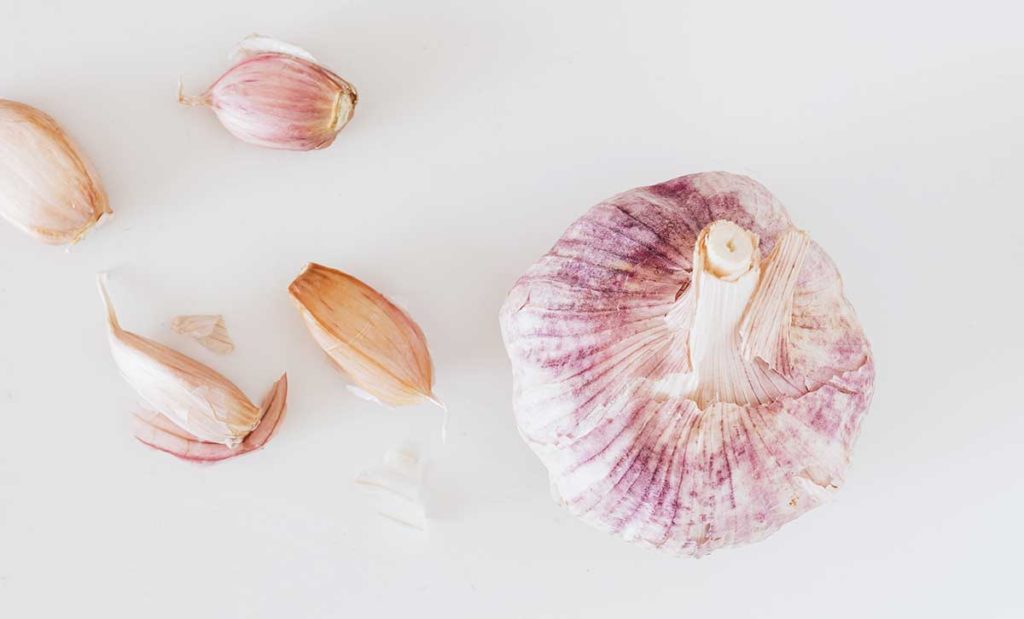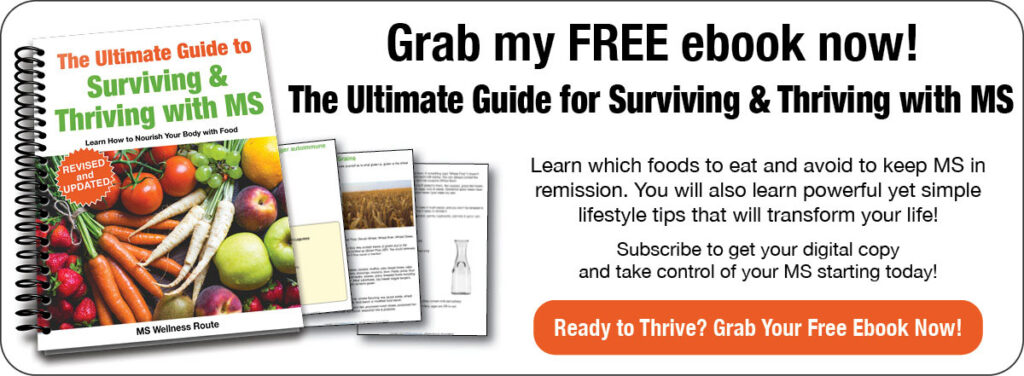Last Updated on December 5, 2023 by Cathy

Gut health and the need to heal your leaky gut are important for those with multiple sclerosis (MS). Researchers have discovered people with MS have different gut bacteria than healthy people. It’s unknown the exact cause of the difference and why. Having a leaky gut is most likely caused by your diet.
Hippocrates, an ancient Greek physician, once said “All disease begins in the gut.” Now health experts believe it to be true. Unfortunately, conventional doctors are a little slow to catch on. They don’t look at the gut to begin the cause of diseases. It’s up to you to change your habits and begin the healing process.
“Natural forces within us are the true healers of disease.” – Hippocrates
What is a leaky gut?
A leaky gut means there is a damaged intestinal lining. It allows food particles and toxins to pass “leak” into the bloodstream. If it’s not taken care of, it will lead to bigger problems like MS. Many different factors may cause a leaky gut making it hard to pinpoint the exact cause.
Having a leaky gut can cause food sensitivities. It also damages cells in your intestines so they don’t produce enzymes needed for digestion. This leads to a weakened immune system and hormone imbalances.
What causes a leaky gut?
Many things can lead to a leaky gut. But, the number one cause is what you eat in your diet. Unfortunately, the Standard American Diet (SAD) doesn’t produce a gut-friendly environment. It contributes to an unfriendly environment. The SAD includes many “healthy” foods known to be inflammatory like gluten, dairy, and soy. It’s full of refined sugar, artificial sweeteners, pesticides, the list goes on and on.
Medications like antibiotics or over-the-counter pain relievers also cause a leaky gut. When food particles and toxins enter the bloodstream it sets off an immune reaction. Your immune system goes into an attack mode and starts attacking itself (YOU).
Eating a poor diet high in processed foods and sugar leads to inflammation of the gut walls. The gut walls allow nutrients to pass through into the bloodstream. But as the lining opens toxins get through. If the openings become large enough undigested food particles also pass through. Left untreated it eventually causes havoc throughout the body leading to autoimmune diseases.
How to heal a leaky gut

Your body remembers what causes inflammation and creates a reaction to it. This could be the cause of food sensitivities. I’ve always eaten tomatoes but then I decided to stop eating them for a while to see if my body reacted. When I started eating them again it caused my face to break out, I was very surprised. That’s why it’s important to remove toxins, heal your gut, and build up your good bacteria levels.
If you’re currently eating SAD, you need to change your dietary habits to heal. Your body is full of chronic inflammation and you have the power to change it. Remove inflammatory foods and start eating foods to promote gut health. That means eating nutrient-dense foods that are healing to your gut.
Foods to avoid:
- Dairy
- Gluten
- Refined sugar
- Artificial flavors and sweeteners
- Natural flavors
- Corn (it’s mostly a GMO)
- Soy (it’s mostly a GMO)
- MSG (harms the brain and central nervous system)
- Nutritional yeast (it has MSG in it)
- Canola oil (it’s mostly a GMO)
- Pork (it’s high in fat and prone to parasites)
- Farmed fish (it’s washed in toxic chemicals due to parasites)
- Eggs
- Processed citric acid (it’s mostly derived from corn)
The foods below are considered healthy but they don’t help the body detox. It’s best to avoid or rarely eat these to help your body heal quicker. You can add these back after your body has healed.
Foods to avoid temporarily:
- Beans
- Chickpeas
- Lentils
- Gluten-free grains like mullet and quinoa
Get Your FREE Gut Health Tracker
Heal Your Leaky Gut with these Healing Foods:
Fruit
Certain fruits can be beneficial for gut health. Fruits are rich in fiber, vitamins, and antioxidants, which can contribute to a healthy gut. Here’s how fruits can help:
- Fiber Content. Many fruits are high in soluble and insoluble fiber. Fiber is essential for maintaining a healthy digestive system. Soluble fiber can help to regulate bowel movements and feed beneficial gut bacteria, while insoluble fiber adds bulk to the stool, aiding in its passage through the digestive tract.
- Prebiotics. Some fruits contain prebiotics, which are compounds that promote the growth and activity of beneficial bacteria in the gut. Bananas, apples, and berries are examples of fruits that contain prebiotics.
- Antioxidants. Fruits are rich in antioxidants, which help to reduce inflammation in the body. Chronic inflammation is linked to various digestive disorders, so consuming antioxidant-rich fruits may contribute to a healthier gut.
- Vitamins and Minerals. Fruits provide essential vitamins and minerals that support overall health, including gut health. Vitamin C, for example, is important for collagen synthesis, which helps maintain the integrity of the gut lining.
Vegetables
When you’re trying to heal a leaky gut it’s best to cook your vegetables rather than eat them raw. The tough fibers in raw vegetables can further damage a weakened gut lining. Steaming, boiling, or sautéing softens the vegetables. This is best to prevent further damage.
Eat a wide variety of vegetables including dark leafy greens, cruciferous, and color. Organic is best to avoid pesticides and GMOs especially those from the Dirty Dozen List. Include vegetables in every meal including breakfast. Green smoothies are a great way to get more nutrients into your body.
Healthy Fats
The American Heart Association labeled coconut oil as bad. But it has many benefits. Yes, it’s saturated fat but it’s not the same saturated fat found in dairy or red meat. Saturated fat in coconut contains lauric acid, an antifungal and antimicrobial.
Coconut milk and oil help soothe the gut lining and fight yeast overgrowth. Cook your foods in coconut oil put coconut milk in your smoothies, and add it to your soups and beverages. Other healthy fats are avocados, avocado oil, olives, olive oil
Healthy Meats
You go into the store and you see your more expensive cuts of meat and the cheaper cuts. But, have you ever wondered what happened to them before they ended up at the slaughterhouse? Conventionally raised animals feed on GMO grains and soy to help fatten them up. They’re given antibiotics and hormones which pass onto the consumer when ingested.
My neighbors were cattle ranchers and gave newborn calves antibiotics. They said they had to give it to them “before they hit the ground.” She was joking but it was probably close to the truth. Instead eat meats that are anti-inflammatory:
- Grass-fed meats
- Pasture-raised poultry
- Wild-caught fish
Fermented Foods
While fermented foods can contribute to a healthy gut microbiome by providing probiotics, which are beneficial bacteria, a balanced diet that includes a variety of plant-based foods offers numerous advantages for your health.
Here are some reasons why consuming fruits, vegetables, herbs, and spices is essential:
- Fruits and vegetables are rich in essential vitamins, minerals, antioxidants, and fiber.
- Fruits and vegetables are excellent sources of dietary fiber.
- Plant foods are packed with antioxidants, which help neutralize harmful free radicals in the body.
- Fruits, vegetables, herbs, and spices contain phytochemicals, which are natural compounds that have many health benefits.
- While fermented foods contribute probiotics to the gut, fruits and vegetables provide prebiotics, which are substances that nourish and support the growth of beneficial bacteria.

Supplements
Sometimes you need a little help with supplements. Supplementing with a good quality probiotic is a great way to increase your good bacteria. Digestive enzymes help break down food to make it easier to digest food and easier on the gut. Here are some supplements to help heal a leaky gut:
- Antifungals to remove Candida overgrowth
- Berberine to help control blood sugar
- Digestive enzymes
- L-Glutamine
- Omega 3s
- Vitamin D3
Stress
Okay, it’s not a food item but it does need to be mentioned. Have you ever felt so stressed out that it made you feel sick to your stomach? There’s a good reason for that. Stress not only plays a huge factor in MS. It can be the trigger to the onset of MS, but it can also bring on MS flares. Chronic stress increases cortisol which is the fight or flight hormone. It increases the blood sugar for that extra power of energy but it also shuts down your digestive system.
When you’re dealing with stress for long periods your body is unable to fight off bad bacteria due to the lack of good bacteria. This leads to imbalances and yeast overgrowth (Candida). Candida and bad bacteria feed on sugar causing even more health problems. If you have Candida you need to get that under control to heal your gut.
It’s impossible to avoid stress but you can learn ways to manage it. Listening to music, reading a book, going for a walk, and even taking deep breaths help. Our gut and brain are connected, which control every nerve in our body. Stay positive, stay calm, and believe you can heal.
Quick Links To Information In This Post:

Get a FREE Gut Health Tracker!
Subscribe for free and I’ll send you the password to my secret library filled with printables including the Gut Health Tracker.







This is so informative! Thank you for the helpful post. I didn’t know that Kombucha could make symptoms worse. I’m working on healing my gut so I should probably stop drinking it for now. Shared on Pinterest 🙂
Thank you! Kombucha has probiotics which are good for you but it also contains wild yeast and bad bacteria. When fighting Candida or SIBO it’s best to avoid until you’re feeling better. Instead, build up your good bacteria with a good quality probiotic supplement.